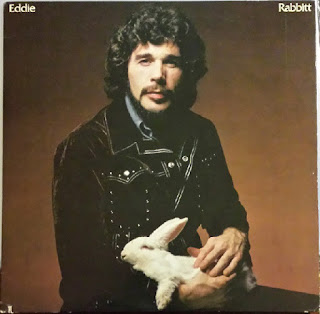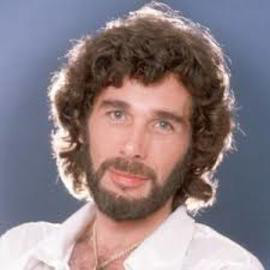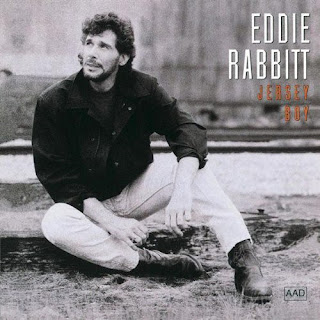Edward Thomas Rabbitt (November 27, 1941 – May 7, 1998) was an American country music singer and songwriter. During his career, Rabbitt scored 26 #1 hits on the country charts, and had 8 Top 40 pop hits. He was named the Top New Male Vocalist by the Academy of Country Music in 1977, and he won an American Music Award for Best Pop Male Vocalist in 1981.
Eddie Rabbitt was born in Brooklyn, New York, but raised in New Jersey. His Irish- American father played both the fiddle and accordion and by the age of 12, having been taught by a scoutmaster who performed under the name "Texas" Bob Randall, young Eddie was proficient on guitar.
A high school drop- out, he worked as a trucker, fruit picker and mental hospital orderly during the day whilst playing Newark's clubs in the evening. He later won a talent contest and was given an hour of Saturday night radio show time to broadcast a live performance from a bar in Paterson, New Jersey. In 1964 he cut an unmemorable debut single, "Six Nights & Seven Days" for 20th Century Records.
In 1968 Rabbitt took the plunge and headed to Nashville by way of the famous WWVA Wheeling Jamboree. On his first night in Music City, whilst sitting in the bath, he penned "Working My Way Up to the Bottom", a song which soon after wards was recorded by Roy Drusky, who charted with it. Despite this initial and unexpected success he found himself earning just $37.50 a week as a staff writer with Hill & Range Publishing, living in an uncomfortable apartment with just a rooster for company.
One of the more positive aspects of this period was the time he spent honing his craft alongside fellow songwriters, notably Kris Kristofferson. It paid off in 1970 when Elvis Presley scored with a Rabbitt composition, "Kentucky Rain". Four years later Ronnie Milsap took his "Pure Love" to the top of the country charts and Rabbitt signed with Elektra Records, making his chart debut for them with "You Get To Me".
In early 1976 he enjoyed his first No 1 as a vocalist with "Drinking My Baby (Off My Mind)". Co-written with his regular collaborator Even Stevens, it had originally been cut by Texas's honky-tonker Johnny Bush and was to prove the first of 17 trips to the top of the country charts. The next, "You Don't Love Me Anymore" (1978), was the first country record to feature synthesised drums, and pointed the way to other pop-flavoured hits including "Someone Could Use a Heart Tonight" and "You Can't Run From Love" (both 1982).
"Every Which Way But Loose" (1979), taken from the Clint Eastwood movie of the same name, helped start a trend in country-oriented movie soundtracks, though Rabbitt refused to record the theme to its sequel Any Which Way You Can (1980). "Drivin' My Life Away" and "I Love a Rainy Night" were infectious up-tempo numbers; the former obviously indebted to Bob Dylan's "Subterranean Homesick Blues" and the latter featuring rockabilly echoes. Both crossed over into the pop charts, selling a million copies each in the process.
A 1982 duet with Crystal Gayle, "You and I", not only topped the charts but gained additional popularity when used as a love theme on the daytime soap All My Children. Four years later another duet, "Both To Each Other (Friends and Lovers)" with Juice Newton, followed suit, though this time propelled to No 1 courtesy of the rival soap Days of Our Lives.
In 1983 Rabbitt's newborn son Timothy was diagnosed with biliary atresia, a condition which necessitated near constant care and ultimately a liver transplant. The child died two years later and Rabbitt, who had already cut back on his touring schedule, never returned to a full-throttle career. Also in 1985 he signed to RCA and, while the hits continued, it became clear that pop-country vocalists like himself were losing ground to the genre's emergent new traditionalist movement. In 1988 he paid tribute to his formative years on the East Coast with an insipid if chart-topping cover of Dion's "The Wanderer". Two years later he scored a final No 1 hit with "On Second Thought" before switching to Capitol where his chart career came to a close.
Rabbitt was among the many country singers who suffered a dramatic decline in chart success beginning in 1991. That year, he released the album Ten Rounds, which produced the final charting single of his career, "Hang Up the Phone". Following that release, he left Capitol Records to tour with his band Hare Trigger. In 1997, Rabbitt signed with Intersound Records where, he released the album Beatin' the Odds. In 1998, he released his last studio album, Songs from Rabbittland.
Rabbitt died on May 7, 1998, in Nashville from lung cancer at the age of 56. He had been diagnosed with the disease in March 1997 and had received radiation treatment and surgery to remove part of one lung. His body was interred at Calvary Cemetery in Nashville following a private burial on May 8, 1998.
(Edited from article by Paul Wadey @ The Independent & Wikipedia)







